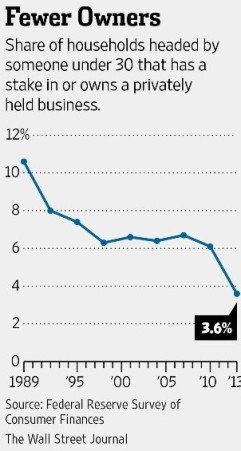January 6, 2015, - 5:39 pm
Mythbusting: Millennials LEAST Entrepreneurial Generation in Decades, Stats Show
We’ve been hoodwinked about the “Hoodie Generation.”
As it turns out, the highly-touted Millennial generation is the LEAST entrepreneurial generation in decades, starting few small businesses and far fewer than that for which they’ve been given credit. As much as I loathe him, they aren’t the Mark Zuckerberg-style entrepreneurs and inventors the media would have us believe. Not even close.


Hoodwinked ‘Bout the Hoodie Generation: Very Few Are Mark Zuckerberg-esque Entrepreneurs
Millennials, who were born between 1980 and 2000, aren’t creating the fantastical, job-producing, Willy-Wonka-Wunderkind-esque, magical stuff that will continue to make America productive. Nope, many of ’em are at home slacking off and playing Gameboy or XBox or whatever, statistics show.
We’ve been told that millennials a/k/a “Generation Y” are so entrepreneurial that they create all kinds of businesses to keep the American economy humming. We’ve been told by the conventional wisdomites that it doesn’t matter that they are the most obsessed with fame and social media, the most narcissistic, and the most ignorant of basics about history, government, and other core stuff. Because, after all, we shouldn’t judge them for being so “different,” “creative,” and “advanced” from us. We shouldn’t judge this group of people who will keep America employed.
Um, wrong (yes, some of this has to do with Barack Obama’s crappy economy and ObamaCare but not all of it):
The share of people under age 30 who own private businesses has reached a 24-year-low, according to new data, underscoring financial challenges and a low tolerance for risk among young Americans.
Roughly 3.6% of households headed by adults younger than 30 owned stakes in private companies, according to an analysis by The Wall Street Journal of recently released Federal Reserve data from 2013. That compares with 10.6% in 1989—when the central bank began collecting standard data on Americans’ incomes and net worth—and 6.1% in 2010.
The Journal’s findings run counter to the widely held stereotype of 20-somethings as entrepreneurial risk-takers. The sharp decline in business ownership among young adults, even when taking into account the aging population, adds to worries about business formation heading into 2015, economists said. The number of new U.S. business establishments fell in the first quarter of 2014, according to the latest available data from the U.S. Labor Department. . . . The decline also reflects a generation struggling to find a spot in the workforce. Younger workers have had trouble gaining the skills and experience that can be helpful in starting a business. Some doubt their ability.
Business ownership among young adults likely remained at low levels in the year that just ended, say some economists. “I wouldn’t expect to see a major pickup” in young adults starting or owning businesses this year, given that it’s easier for them to find jobs, said Robert Litan, a Brookings Institution economist. . . .
The proportion of young adults who start a business each month dropped in 2013 to its lowest level in at least 17 years, according to the Ewing Marion Kauffman Foundation, a Kansas City, Mo., nonprofit that focuses on entrepreneurship. People ages 20 to 34 accounted for 22.7% of new entrepreneurs in 2013, down from 26.4% in 2003, it found.
The plunge in business ownership captured in the Fed survey is an “interesting and worrisome finding,” said John Davis, faculty chair of the Families in Business Program at Harvard Business School. If the trend continues, he said, the U.S. economy could become less vibrant. “We need startups not only for employment, but also for ideas,” Mr. Davis said. “It’s part of the vitality of this country to have people starting new businesses and trying new things.”
The decline in young entrepreneurs is part of a broader drop in private business ownership over the past 25 years. Between 2000 and 2012, new business formation slowed even in such high-growth sectors as technology, according to economists John Haltiwanger and Ryan Decker of the University of Maryland and Javier Miranda of the Census Bureau. . . . Overall, the U.S. “startup rate”—new firms as a portion of all firms—fell by nearly half between 1978 and 2011, according to an analysis by Mr. Litan and his research partner, economist Ian Hathaway. . . .
The decline in business ownership among young graduates also reflects a relatively low appetite for risk. Young people have less confidence, said Donna Kelley, a professor at Babson College. In an annual survey she oversees, more than 41% of 25-to-34-year-old Americans who saw an opportunity to start a business said fear of failure would keep them from doing so, up from 23.9% in 2001. “The fear of failure is the measure we should be most concerned about,” she said.
I would be fearful of starting a new business under an ObamaCare-riven economy and with regulations at an all-time high.
But this is bad for America for another reason. The fear of failure wasn’t an American value. We were a brave country that took risks. It is the story of the very founding of America, a risk which many Colonist loyalists to the British Crown didn’t want to take. But we took it and went to war and won, with all odds against us.
And we took many other risks, whether it was the Louisiana Purchase or the entry into World War II (which we did kicking and screaming and not until after we were attacked at Pearl Harbor). Developing the atomic bomb was a risk in many ways and on many levels. But it defeated Japan in World War II, and our nuclear build-up under President Reagan finally broke the yoke of Communism in the Soviet Union. The Space program and sending a man to the Moon were risks and if we let failure paralyze us then, we wouldn’t have done that, nor would we have many of the technological advances we have today, many of which emanated from the space program.
So, now, we have a generation of those who fear risk and a country that fears taking any risks. We do so at our peril.
On top of that, we continue to believe the myth that things actually are “better,” and that a generation of ignorant, Facebook-addicted morons are gonna save us and are currently saving us. . . when it couldn’t be further from the truth.
If America and Americans are not inventing things and creating businesses, then we are dying. How long ’til rigor mortis sets in?
***
One thing not explored in the article quoted above is the attack on males and masculinity that has reached an all-time high in this generation, with the gender roles blurred completely now. That’s an important factor here because throughout American history, the great inventors and entrepreneurs have almost always been male. Now, they are relegated to future Mr. Moms or slackers, who can give up their ambitions and dreams while some women take care of them and welfare and entitlements relieve them of responsibility for sleeping around, fathering kids, and supporting families.
So there is far less incentive for men to invent things, start small businesses, etc. than there has historically been in this country. Yay, feminism!
Tags: Donna Kelley, Donna kelley Babson College, entrepreneurs, Ewing Marion Kauffman Foundation, Federal Reserve, Generation Y, Javier Miranda, John Davis, John Davis Harvard, John Haltiwanger, Mark Zuckerberg, Millennial Generation, Millennials, Ryan Decker, U.S. Labor Department


Different, creative and advanced?
I don’t think there have ever been so many people in this country (especially the Gen-Y) group who are “artists”, “writers” and “musicians”. Virtually none of them have any talent, but this is how they define their lives.
Or else, way too many of them are on someone’s Obamacare coverage, or getting one student grant after another, or making fools of themselves demonstrating in the streets.
Or they wind up in the ever-expanding educational (sic) system, transmitting their own idiocy to younger people.
One entrepreneurial group that is really suffering is the companies who manufacture soap, laundry items, and other personal hygiene products.
Little Al on January 6, 2015 at 5:56 pm